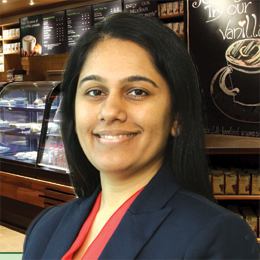New York, Sep 4: Tata Starbucks CEO Avani Davda is the only Indian featured in Fortune and Food & Wine's list of 25 "most groundbreaking" women who are changing the way people eat and think about food.
 Davda, ranked 13 on the 'The Most Innovative Women in Food and Drink' list, leads the joint venture between the American coffee giant and its partner Tata Global Beverages in India, "historically a tea-drinking nation" where coffee is on the rise and a market where Starbucks is looking to profit.
Davda, ranked 13 on the 'The Most Innovative Women in Food and Drink' list, leads the joint venture between the American coffee giant and its partner Tata Global Beverages in India, "historically a tea-drinking nation" where coffee is on the rise and a market where Starbucks is looking to profit.
In less than two years, Davda has opened 52 stores across Mumbai, Delhi, Pune, Bangalore, and Chennai.
Fortune said Davda, 34, has balanced Starbucks staples like Frappuccinos with local offerings.
Her team launched an India-sourced and roasted coffee, called India Estates Blend, to mark Starbucks' first anniversary in the country.
Fortune and its Time Inc sister publication Food & Wine spent months searching for the "most groundbreaking women in the food and drink world".
The publication said the women on list may not operate at the same scale as the big industry players such as PepsiCo's India-born CEO Indra Nooyi and Mondelez International CEO Irene Rosenfeld, who are regulars on Fortune's Most Powerful Women in Business ranking.
"But this group is permanently changing the way we eat and how we think about food. Now that's power in its own right."
The list also includes United Nations World Food Programme Executive Director Ertharin Cousin who as the head of the world's largest humanitarian organisation combating hunger, leads a team that must quickly get aid to those faced with conflict and natural disaster.
Congresswoman Chellie Pingree has made food policy reform one of her big issues in Congress, pushing for legislation that supports local, sustainable agriculture.
The list also includes Global Vice President of Quality Standards at American foods supermarket chain Whole Foods Margaret Wittenberg, TV personality and author Rachael Ray, cookware and gourmet food giant Williams-Sonoma CEO Laura Alber and Rural Outreach Africa founder Ruth Oniang'o, who has raised money to help 30,000 small farmers in Kenya, most of whom are women.




Comments
Add new comment